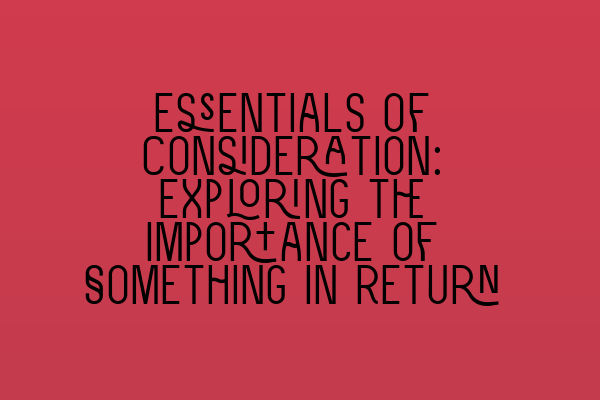E Essentials of Consideration: Exploring the Importance of Something in Return
Welcome to the SQE Contract Law blog! In this post, we will delve into the essential concept of consideration in contract law and explore its importance in ensuring that agreements are legally binding. Consideration is a fundamental element of a contract, representing something of value that is exchanged between parties to a contract. Without consideration, a contract may lack validity and enforceability.
But why is consideration so important? Let’s find out by diving deeper into its meaning, types, and significance in contract law.
Understanding Consideration
In contract law, consideration refers to the price that one party pays to receive something of value from another party. It can take various forms, including money, goods, services, promises, or forbearance to act. The key principle is that consideration must have value, or legal sufficiency, and be bargained for.
Consideration ensures that both parties in a contract have given up something valuable or made a promise, establishing a mutual exchange of benefits and detriments. This vital exchange distinguishes a contract from a mere gift or gratuitous promise.
The Importance of Consideration
Consideration plays a vital role in contract law for several reasons:
- Legally Binding Agreement: Consideration is a crucial element in determining the enforceability and validity of a contract. Without consideration, an agreement may be deemed merely an intention to be bound, lacking the intention to create legal relations.
- Evidence of Consent: The presence of consideration indicates that both parties willingly and knowingly entered into the contract. It serves as evidence of mutual assent and protects against claims of duress or undue influence.
- Equitable Exchange: Consideration ensures fairness and equity in contract relationships. It establishes that both parties are giving and receiving something of value and prevents one-sided, unconscionable agreements.
- Preventing Gratuitous Promises: By requiring consideration, contract law discourages unfounded claims or promises made without any reciprocal commitment. This acts as a safeguard against frivolous or unwarranted legal disputes.
Types of Consideration
Consideration can be classified into two main types: executory and executed consideration.
Executory Consideration: This refers to a promise made by one party to do or refrain from doing something in the future. For example, when someone promises to deliver goods or provide services at a later date in exchange for payment, executory consideration is present.
Executed Consideration: Executed consideration is when both parties have already fulfilled their obligations under the contract. This typically occurs when simultaneous exchange takes place, such as paying for goods at the time of purchase.
The Doctrine of Promissory Estoppel
While consideration is necessary to form a binding contract, there are rare circumstances where a promise may be enforceable without consideration. This exception is known as the doctrine of promissory estoppel.
Under this doctrine, a promise can be enforced even if there is no consideration if the following elements are present:
- A clear promise is made by one party to another.
- The promisee relies on the promise to their detriment.
- Enforcing the promise is necessary to avoid injustice.
Promissory estoppel serves as an equitable remedy when enforcement of the promise is necessary to prevent unconscionable conduct or extreme injustice.
Conclusion
In conclusion, consideration is a fundamental concept in contract law that ensures the enforceability and validity of agreements. It represents the exchange of something valuable between parties and establishes fairness and mutual assent. Understanding the importance of consideration is crucial for solicitors, as it helps them draft and interpret contracts accurately.
For further reading on related topics, we recommend the following articles:
- Navigating Legal Challenges and Pitfalls in Your Practice
- Barrister vs. Solicitor: A Comprehensive Comparison
- Exploring Different Solicitor Specializations: Finding Your Niche
- Top Recommendations for Law Schools in the UK
- Embracing the Rise of Virtual Law Practices
Thank you for reading this comprehensive blog post on the essentials of consideration. If you have any questions or would like to explore contract law further, please do not hesitate to contact SQE Contract Law.
